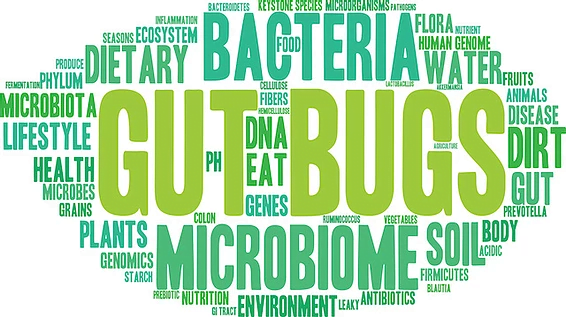More than 70% of your immune system resides in your gut. Yes, you read that right. 2/3rd of of the immune tissue is located within the digestive system.
That means that the intricate system that protects you and keeps you healthy is influenced by your intestinal flora and what happens in the digestive tract.
In fact, the gut and the immune system have formed a complex integrated structure that supports both digestion and immune defense. [1]
Our microbiome acts as a gatekeeper, trying to prevent pathogens to penetrate its boundaries and enter systemic circulation. The mucosal membranes lining the digestive tract are the optimal point of entry for pathogens to invade. When these harmful bacteria penetrate the gut wall they can trigger an immune response. This is basically the alarm sounding, telling the body that there is an intruder.
This interaction suggests a direct link between a healthy digestive tract and a healthy immune system. Therefore, it make sense that an imbalance in the gut (called dysbiosis) can weaken the overall immune system and make the host more susceptible to colds and other pathogens.[1]
If our immune system is working overtime to capture bad guys and put out fires, then we are left with an immune system that is not functioning at its optimum. This is why, most of the time when your immune system is weak and depleted, it can be traced back to what is happening in your gut. Maintaining microbial balance in the gut is key to a healthy immune system.
In order to maintain a healthy balance consume a healthy vegetable based diet, exercise, maintain a healthy weight and manage stress.
Adding Probiotics and prebiotics will also help. In fact, systemic immune response has been shown to be modified by changing the microflora through supplementation of probiotics.[2] Probiotics have also been shown to regulate the host immune response. Indeed probiotics have been found to enhance the innate immunity and modulate pathogen-induced inflammation via toll-like receptor-regulated signaling pathways. [3]
There are 3-4 main types of probiotics that aid in regulating the immune system:
-
Lactobacillus Acidophilus; which produces vitamin K and lactase, and is most commonly found in the upper digestive tract.
-
L. -Acidophilus; which has been shown to improve digestion, blood pressure and cholesterol; reduce lactose intolerance; increase absorption of calcium and B vitamins; help the body fight viral, bacterial and fungal infections; decrease allergy symptoms; and decrease the likelihood of developing kidney stones.
-
Bifidobacterium Lactis: it inhabits the intestines and colon, and its main job is to break down waste and absorb various vitamins and minerals. B. Lactis has been shown to improve digestive conditions by decreasing intestinal permeability and relieving general digestive discomfort; improve oral health by fighting dental caries; and enhance immunity by reducing the frequency and severity of respiratory diseases.
-
Lactobacillus (L.) Bulgaricus is one of the lesser known probiotics, but it has significant benefits for immune health. Inhabiting the intestinal mucosa, L. Bulgaricus helps to reduce intestinal infections by adjusting the pH of the GI tract to promote healthy flora growth; increase immunity by releasing natural antibiotics; and fight infections by blocking pathogen adhesion sites within the intestinal mucosa.
Prebiotics can also help maintain a healthy immune system through the gut. Prebiotics are to be taken along with probiotics as they help to decrease the non beneficial bacteria while supporting the growth of the beneficial bacteria. In contrast to the probiotic action, which provides living microorganisms, prebiotics stimulate the activity of healthful bacteria. Prebiotics are found in many foods such as bananas, asparagus, onions, leek, garlic, and artichokes to name a few.
In conclusion, if there is one thing to remember it is that a healthy GI tract is key to maintaining optimal immune health. Maintaining a healthy microbial balance in the gut can be done through a healthy diet, daily exercise and if needed, pre and probiotic supplements. So next time you feel a cold coming on; try probiotic or prebiotic foods and supplements first!
References:
-
Lee YK, Menezes JS, Umesaki Y, Mazmanian SK. Proinflammatory T-cell responses to gut microbiota promote experimental autoimmune encephalomyelitis. Proc Natl Acad Sci 2011;108 (S1):4615 – 22.
-
Vitetta L, Coulson S, Linnane AW, Butt H. The Gastrointestinal Microbiome and Musculoskeletal Diseases: A Beneficial Role for Probiotics and Prebiotics. Pathogens. 2013;2(4):606-626. doi:10.3390/pathogens2040606.
-
Fang Yan, D.B. Polk. Probiotics and immune health. Curr Opin Gastroenterol. Author manuscript; available in PMC 2014 May 2.




